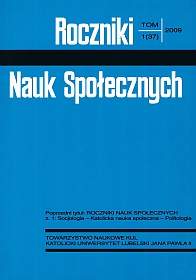Integralność praw, człowieka
Abstrakt
The leading motif in the Church’s teaching is the inborn and supernatural dignity of each human being that is the only and supreme moral norm. It is from this norm that human rights and other principles follow. The first and fundamental way of the Church is recognizing each human being’s dignity, and reminding: Respect the dignity and freedom of every human person! During the meetings of the OSCE the Holy See mainly promoted the right to freedom of conscience and of opinions in connection with all human rights. It postulated recognition of human rights as a principle of the international law.
Overcoming the dispute concerning the contents of the concept of human rights was possible, among others, at the Vienna Conference. There it was said that all human rights follow from the dignity of the human person and from the human being’s inherent value; it was also stated that the human person is the main subject of human rights and fundamental freedoms, so he should be their main addressee and actively participate in the realization of the rights. In the document accepted at the Copenhagen Conference the human person was recognized as the supreme value that is the foundation of the inborn and inalienable human rights. Moreover, the contents of the concept of the right of man to freedom of conscience, to religious freedom and to freedom of opinions is contained in Art. 18 and 19 of the Universal Declaration of Human Rights and developed in the same articles of the International Convention for Personal and Liberation Rights.
The human rights may be protected in democracy and in a law-governed state. John Paul II stressed that real democracy is possible in a law-governed state on the basis of the correct concept of the human person. The essence of democracy is respecting all the human rights.
Copyright (c) 2009 Roczniki Nauk Społecznych

Utwór dostępny jest na licencji Creative Commons Uznanie autorstwa – Użycie niekomercyjne – Bez utworów zależnych 4.0 Międzynarodowe.


